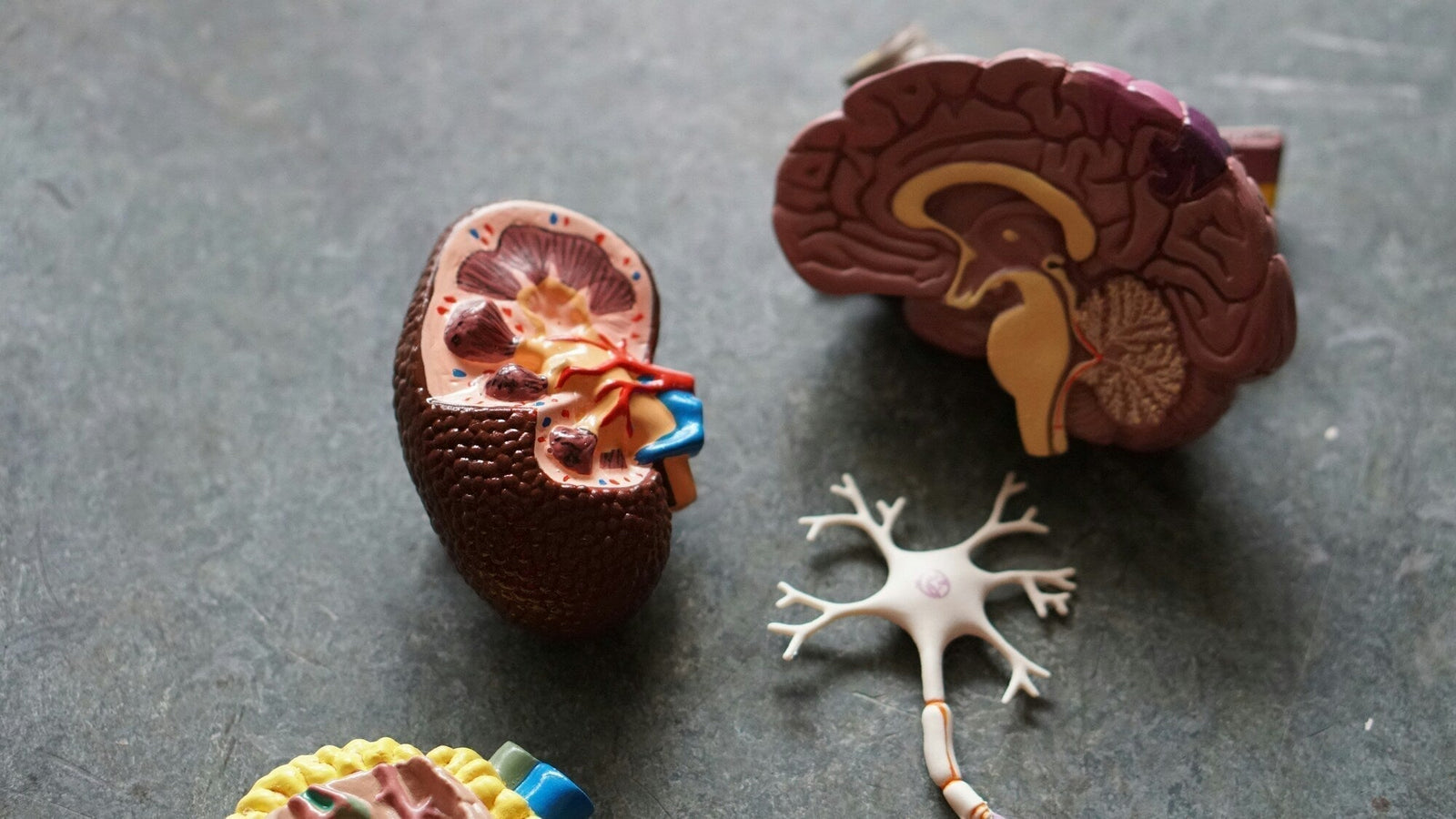Your Cart is Empty

May 22, 2024 7 min read
Take our quiz and find which supplements your body is craving.

Written by Chris Bellanger, BHSc in Nutritional Medicine
Creatine, derived from the Greek word “kreas,” meaning “meat” because it only naturally occurs in animal foods, is one of the most popular and widely researched supplements used by athletes. Due to its ability to regenerate ATP levels rapidly, it’s best known as a way to enhance power and strength.
However, many people don’t realize that creatine also has some amazing benefits for cognitive and mental health. In this detailed guide, we will unveil the surprising, often neglected roles of creatine in brain health, cardiovascular health, and sleep.
Creatine supplements are primarily known for their performance-enhancing effects in athletes and fitness enthusiasts, which include improvements in power output, strength training adaptations, and enhanced exercise capacity, both in the general population as well as older adults.[1] [2]
However, research has more recently also uncovered numerous potential health benefits associated with creatine supplementation.
These briefly include: [2] [3]

Emerging research indicates that creatine may have neuroprotective properties, potentially benefiting brain health and cognitive function, particularly in populations with below-average creatinine levels, such as vegans, older populations, or people with mild cognitive impairments. [2] [4] [5] [6]
Studies have shown that creatine supplementation can increase brain phosphocreatine levels, which may help to buffer energy deficits by enhancing brain bioenergetics. It may also protect against neurodegenerative conditions such as Parkinson's and Alzheimer's diseases, conditions with a progressive and irreversible loss of neuronal function that hamper the performance of cognitive and motor tasks.[3]
Creatine has also been investigated for its potential to improve cognitive performance and memory in both healthy individuals and those with neurological disorders.
It also increases oxygen utilization in the brain, helping reduce cognitive fatigue while improving working memory and processing speed.[5] [7]
There's some great news for those who are burning the candle at both ends with excessive work and social commitments.
Recent research found that just one large dose of creatine could improve cognitive performance in people experiencing the negative effects of acute sleep deprivation. [8] [9] [10]

Creatine has the ability to enhance GLUT4, a vesicle transporter for glucose into the cell, thereby helping to reduce high blood sugar, particularly in combination with exercise.[11] [12]
Creatine supplementation has shown promise in the treatment of certain medical conditions characterized by muscle weakness or wasting and subsequent loss of strength and bone mass, such as sarcopenia and muscular dystrophy, or simply due to aging.
Some research suggests that creatine supplementation may help to preserve bone density and muscle mass, thus maintaining muscle function and enhancing quality of life in individuals with muscular dystrophy and related conditions. [3] [13] [14]
There is growing evidence to suggest that creatine supplementation may have positive effects on cardiovascular health.
Creatine shows great promise in this area by improving blood pressure, lipid profiles, and cardiac function in people with heart failure.
Creatine also helps maintain optimal heart function by supporting bioenergetics, particularly during ischemic events such as heart failure.[15]

Creatine has antioxidant properties that may help to combat oxidative stress and protect against cellular damage. By scavenging free radicals and reducing oxidative stress, creatine may support overall health and reduce the risk of chronic diseases such as diabetes and cardiovascular disease.
Oxidative stress and mitochondrial damage are also common features in neurodegenerative diseases.[3]
Two common forms of creatine found in supplements are creatine monohydrate (CM) and creatine hydrochloride (HCl). While both forms help increase creatine stores in the muscles, there are a few key differences.
Creatine monohydrate is the most researched and commonly used form of creatine. It consists of creatine molecules bonded with a water molecule, resulting in a highly soluble powder. Creatine hydrochloride is bonded with a hydrochloride molecule, making it much more bioavailable; as a result, smaller dosages seem to be sufficient to achieve the same effects.
Creatine HCl is typically marketed as causing less gastrointestinal discomfort than creatine monohydrate. This is because the monohydrate form is often taken in loading doses of up to 20 grams at the commencement of supplementation. The larger required dosages cause gastrointestinal issues, which the HCL form negates. This explains why it’s quickly becoming more popular, especially in the antiaging and biohacking spaces.
Research on creatine monohydrate is far more extensive, and the hydrochloride form has not been commercially available for nearly as long. Therefore, while HCl seems highly promising, the research is still in its early stages.
It appears that the two have comparable outcomes for athletes. However, since creatine HCL is more easily absorbed by the body, a lower dosage is required for the same outcomes without causing the gastrointestinal issues associated with the monohydrate form.
Additionally, two studies showed superior benefits for body composition in those taking the HCl form.[16] [17] [18]

Both creatine monohydrate and creatine HCl are ultimately converted into phosphocreatine within the body, which plays a key role in the regeneration of adenosine triphosphate (ATP), the primary energy source for muscle contractions during high-intensity exercise.
Numerous studies have demonstrated the performance-enhancing effects of creatine supplementation, including improvements in strength, power, and muscle mass, by increasing phosphocreatine levels in muscle tissue.
While fewer studies have directly compared the effects of creatine monohydrate and creatine HCl supplementation, research so far suggests that creatine HCl is similarly effective in increasing muscle creatine levels and improving performance, but at a lower dosage.
Creatine's shiny reputation as the bodybuilding holy grail is well-deserved and scientifically proven. However, what many people don't know about creatine is that it is much more than just a go-to supplement for muscle building, performance enhancement, and fat loss. Its part in cardiovascular health, glucose management, bone health, and cognitive functions is equally as significant. Remember that, to get the most out of your creatine supplement, the form you choose matters, especially if you suffer from gastrointestinal discomfort.

March 03, 2025 7 min read
Discover how Bryan Johnson, a tech entrepreneur turned biohacker, uses cutting-edge science and personalized genetic testing to revolutionize health and longevity. Learn how biohacking, from diet to mental health practices, can help you live longer and healthier, with practical strategies to optimize your well-being. Find out more about genetic testing, and ways to implement results into your wellness routine.

February 19, 2025 6 min read
Explore the remarkable health benefits of medicinal mushrooms like Lion’s Mane, Turkey Tail, Chaga, and Reishi. These superplants support immune function, reduce inflammation, and boost brain health. Learn about Amandean's Brain Health supplement, combining Lion’s Mane, Magtein, and Alpha-GPC for optimal cognitive performance.

February 10, 2025 7 min read
Unlock your brain’s full potential with Amandean’s Brain Health Supplement. Packed with Magnesium L-threonate (Magtein), Lion’s Mane Mushroom, and Alpha-GPC, this formula enhances memory, focus, mood, and cognitive longevity.